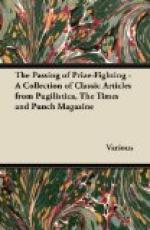* * * * *
[Illustration: NEW SEASON’S NOVELTIES.
1. THE CAT’S-MEAT HAT-PIN PROTECTOR.
2. THE MUD-SPLASH VEIL.
3. THE THROAT CORSET.]
* * * * *
MISUNDERSTOOD.
(A Story of the Stone Age.)
Of all the young bachelors in his tribe not one was more highly esteemed than Ug, the son of Zug. He was one of the nicest young prehistoric men that ever sprang seven feet into the air to avoid the impulsive bite of a sabre-tooth tiger, or cheered the hearts of grave elders searching for inter-tribal talent by his lightning sprints in front of excitable mammoths. Everybody liked Ug, and it was a matter of surprise to his friends that he had never married.
One bright day, however, they were interested to observe that he had begun to exhibit all the symptoms. He brooded apart. Twice in succession he refused a second help of pterodactyl at the tribal luncheon table. And there were those who claimed to have come upon him laboriously writing poetry on the walls of distant caves.
It should be understood that in those days only the most powerful motive, such as a whole-hearted love, could drive a man to writing poetry; for it was not the ridiculously simple task which it is to-day. The alphabet had not yet been invented, and the only method by which a young man could express himself was by carving or writing on stone a series of pictures, each of which conveyed the sense of some word or phrase. Thus, where the modern bard takes but a few seconds to write, “You made me love you. I didn’t want to do it, I didn’t want to do it,” Ug, the son of Zug, had to sit up night after night till he had carved three trees, a plesiosaurus, four kinds of fish, a star-shaped rock, eleven different varieties of flowering shrub, and a more or less lifelike representation of a mammoth surprised while bathing. It is little wonder that the youth of the period, ever impetuous, looked askance at this method of revealing their passion, and preferred to give proof of their sincerity and fervour by waiting for the lady of their affections behind a rock and stunning her with a club.
But the refined and sensitive nature of Ug, the son of Zug, shrank from this brusque form of wooing. He was shy with women. To him there was something a little coarse, almost ungentlemanly, in the orthodox form of proposal; and he had made up his mind that, if ever he should happen to fall in love, he would propose by ideograph.
It was shortly after he had come to this decision that, at a boy-and-girl dance given by a popular local hostess, he met the divinest creature he had ever seen. Her name was Wug, the daughter of Glug; and from the moment of their introduction he realised that she was the one girl in the world for him. It only remained to compose the ideograph.
Having steadied himself as far as possible by carving a few poems, as described above, he addressed himself to the really important task of the proposal.




